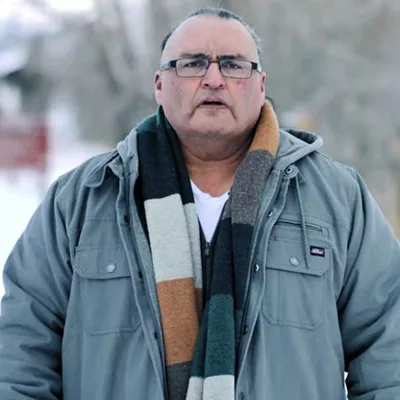This Saturday, Aug. 6, will be the 66th anniversary of the atomic bombing of Hiroshima, Japan. A group of Tucson organizations have banded together to hold a special memorial event that commemorates the attacks on Hiroshima and Nagasaki—while calling attention to current problems.
The nuclear crisis at the Fukushima power plant in Japan after March's earthquake and tsunami helped push the issue of nuclear power back into public consciousness. The irony that such a serious nuclear disaster took place in the only country ever to be on the receiving end of a nuclear attack has not been lost.
The Women's International League for Peace and Freedom, and the Peace and Social Concerns Committee of the Pima Friends' Meeting (Quakers) are two of the event's sponsors. A lot of planning and organizing has also been done by Tucson's Raging Grannies, the local branch of the international activist organization of women 65 and older who pour their energy into environmental and social causes.
Born in the 1980s in British Columbia, Canada, when residents got together to protest the presence of nuclear-powered U.S. Navy vessels, the Grannies have been going strong since. Its members are known for dressing in clothes that mock the stereotypical little old lady while singing protest songs set to well-known tunes.
"We like to think we oldsters can still do something," said Margaret Pecoraro, a Raging Granny who says that members of younger generations are often the most appreciative of their work.
Saturday's event will feature a talk by another Tucson Raging Granny, Lea Goodwine. She spent more than three years teaching conversational English in Japan, and many of her students and their family members lived through the bombings. While there, she had the opportunity to attend a Japanese atomic memorial, and the event left an indelible impression on Goodwine.
"There were thousands of people there (at the memorial, but) it was the most profound silence," said Goodwine.
During the memorial service, candles where lit and placed in small boats to float down a river that many Hiroshima victims used in an attempt to escape.
"That event ... brought home what that kind of destruction does to human beings on an individual level," said Goodwine.
Goodwine said she hopes people will leave Saturday's event with a better understanding of the dangers that nuclear power poses.
Even though 66 years have passed, the U.S. decision to drop the nuclear bombs remains controversial and divisive. Since the atomic bombing, the threat of nuclear warfare and the destruction it can inflict have been sources of fear.
This year's service will differ from previous events, as it will focus both on the bombings during World War II and more-recent nuclear crises, especially the one at Fukushima.
Guest speaker Russell Lowes, research director for SafeEnergyAnaylst.org, will discuss commercial and military nuclear development, and how the two are inevitably linked.
As problems such as climate change and the United States' dependency on foreign oil continue to grab headlines, nuclear energy has been mentioned as a possible alternative to fossil fuels. Lowes has spent years researching the economic, health and environmental aspects of nuclear power—and has found it to be lacking, for reasons he will cover at the memorial.
One example Lowes mentioned is the huge amount of energy, money and time that it takes to build a nuclear power plant, and the large amount of greenhouse gases that are produced during the construction.
The nuclear crisis in Japan has also renewed concerns about nuclear meltdowns. According to Lowes, the United States needs to pay attention to these concerns, because many nuclear plants are getting older and being modified to work longer than their designed life spans. According to Lowes, one of the most important things people can do is elect politicians who understand the need for a clean, progressive energy policy.
"I'd like people to realize we need to switch to soft energy," such as solar and wind power, said Lowes.
The event will end with a candlelight vigil led by the Grannies, who will be dressed in white, the color of death and mourning in Japanese culture.






